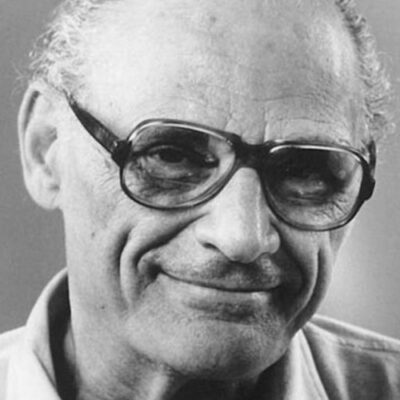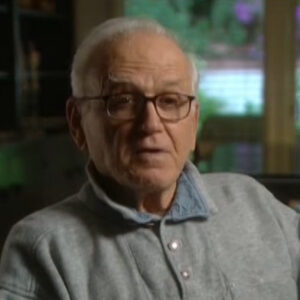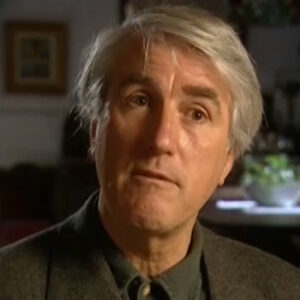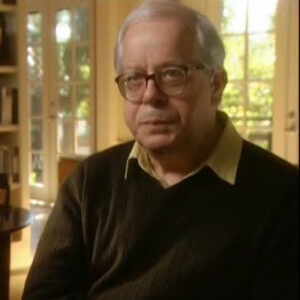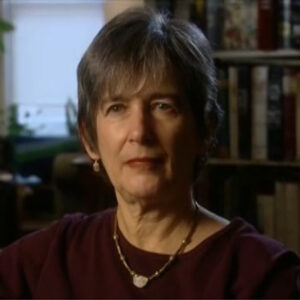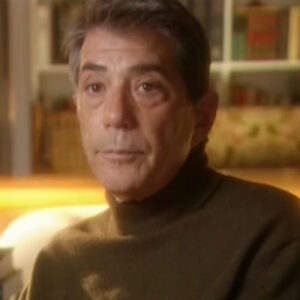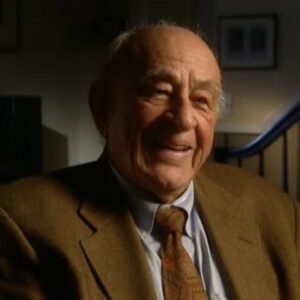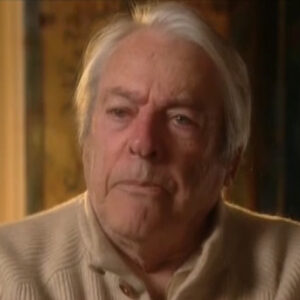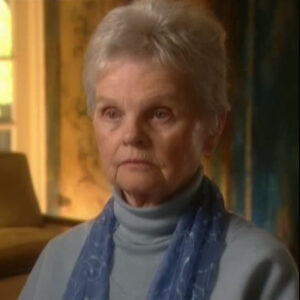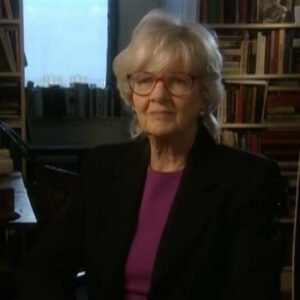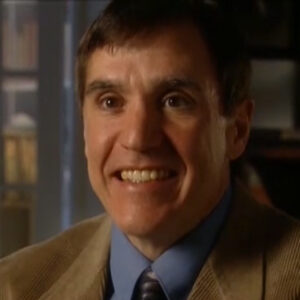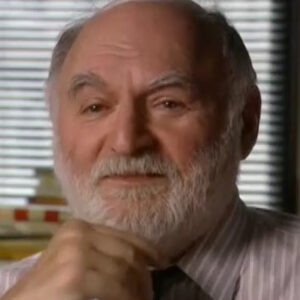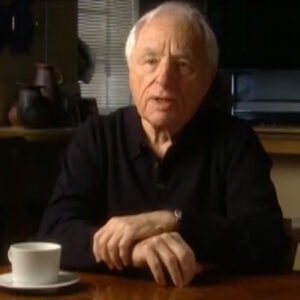Interviewer: Do you remember the first time you met Elia Kazan?
Lee Grant: Yeah, I met I met Gadge when I was in the actor studio, which I was invited into by Sandy Meisner, who had been my teacher at the Neighborhood Playhouse. And and Gadge had wanted me to do Camino Real with him. And so I did a couple of rehearsals and then I bowed out of it because this much vaunted way of his working with actors didn’t work for me in a play. I know that if it was on film, you know, he’s kind of whispering in my ear all the time would have been good because he would have gotten one take up, another take up and different things. But for theater, I felt by his whispering in my ear and making me do different things for him that he loved and that I loved doing, too. But I felt very ungrounded for the theater. I felt like I did not have any sense of my own, what this character was and that and that the way he worked was too unsettling for me. So so I. I dropped out of it.
Interviewer: Did you stay in the Actor’s Studio and continue to study in the Actor’s Studio?
Lee Grant: Oh, sure. Sure. Yeah. Yeah.
Interviewer: What was the Actor’s Studio like. He has this. As you say, wanted this sense of. A unique place in American theater history, what it must have been a tremendous energy at the Actor’s Studio.
Interviewer: Well at the time when I was there in the early days, Bobbie Lewis was there, Kazan was there. I don’t think Strausberg was there yet. Sandy Meisner was there. So it had the energy came from all these different, you know, remarkable talents and remarkable directors and teachers and actors themselves. Later on, it became just Strasbourg’s Actors Studio. And for me, that was not as interesting.
Interviewer: Right. But that first meeting there were the names of the people that either went through or came out of the studio, especially those first early years, are just remarkable.
Lee Grant: Yeah.
Interviewer: What was it about Kazan that made the studio or made the people he attracted so unique? I mean, there was nobody else that quite had people in his orbit the way that Kazan did. What was it about the man?
Lee Grant: Well, artistically, there was a great generosity. There was a great energy. There was a great imagination. There was a great originality so that he wasn’t talking down to you. He was as an actor since he was an actor. He was with you. He he was excited by you. There are several directors that I’ve had that I’ve that I’ve had that that feeling from. And that’s and that’s a feeling that makes you go further yourself.
Interviewer: It gives you a sense of trust that you’re not going to be made a fool of her allowed to fall.
Lee Grant: Well, I really. I didn’t get a sense of that. I wouldn’t be made a fool of or allowed to fall by Gadge. Actually, I thought very much that I could fall, that I was on uncertain grounds, but that he was an exciting man and an exciting artist.
Interviewer: You know, before I go further, I realize that not everybody knows Gadge. Why do you call Kazan, Gadge?
Lee Grant: Oh, I called him Gadge because everybody else did. I mean, I don’t. I don’t know anybody who called him Elia. I don’t know anybody who called him Elia.
Interviewer: So his affection. Everybody called him Gadge?
Lee Grant: Well, you know, I don’t know whether it was affectionate or not, but that was what everybody called him.
Interviewer: I guess it grew out of the group theatre. And he supposedly hated it. But everybody did it. You know. You know, it’s very sad. He’s not really. He’s an old man now and he’s not. I met with him and he’s not clearly present in the way that he was before. Can you help me just physically see the Gadge that you have in your mind’s eye? Was he demure? Quiet, too.
Lee Grant: Demure, quiet? No. He was he was a bombshell of energy and a bombshell of excitement and of warmth and. And he was also a very, very attractive man to me.
Interviewer: Because he is physically he was physically beautiful.
Lee Grant: I’m not attracted to physically beautiful men I’m attracted to men who are really men and who come from work, usually a working class place, and that’s where Gadge came from, so that his energy, his his. His eye, his kids, his feelings were street feelings. And and that’s an exciting place to be right now.
Interviewer: You’re one of the few people that we’re going to talk to you, who is both a director and an actor. And you know what it’s like to be both behind and in front of the camera. So I think of today’s audience. The younger generation thinks that a great director is a lot about flash quick cuts and special effects. That really wasn’t in Kazan’s vocabulary. So what is it, if you do believe this, that made Kazan a great director of fim?
Lee Grant: Of film was a great director of film and of theater.
Interviewer: But what made him great then?
Lee Grant: Talent. I mean, people are great because of their talent and talent is mysterious. Talent is ephemeral.
Interviewer: I guess what I’m asking is how do that talent manifest itself. When you watch a Kazan picture, when you went to the theater and you saw a Kazan production. What were you getting? That was different than it was.
Lee Grant: The actors, the performances were pushed to the furthest place that they could be. It it was you had a sense of risk, your sense of not knowing what was going to happen next or that the actor didn’t know what was going to happen next to him. There was a visual sense of excitement of the of the camera being into the actors soul. It had an immediacy. That. That most productions, theatrical productions and films didn’t have.
Interviewer: Yeah, I think that is. I think it’s very well articulate because I think of early Hollywood or things in the 30s or 40s and there’s everybody is at arm’s length. You know, I love George films. But, you know, if the camera seems a million miles away, you might think of Street car, I think of. Although, I mean, there is a sense it’s dripping with life. Can I shift focus for a minute and ask you, do you do you think about the blacklist at all or the McCarthy era still today? Or is that time like a book that you maybe have once read? There’s no sitting on your shelf collecting dust.
Lee Grant: No, the blacklist was an integral part of my life and it never leaves out. The effect of the blacklist is still with me. It manifests itself and in ways that still continue in my life. The people I’ve lost who were blacklisted and and and whose lives were cut short. What happened to me? The energy that I was given, the love of the traumas that I had from it? No, it stays.
Interviewer: Is it an anger, that stays. Is it a sense of loss? What is it that you carry still?
Lee Grant: The anger isn’t really there anymore. The anger was what really drove. Need to fight the blacklist to put in all those years fighting it. And sustained me. I love that anger. It was the healthiest, most exciting anger and the most active and. And. Feeding me anger propelled, even purpose. It gave me the anger, gave me purpose and and I never wanted to let go of it. And after I got off the blacklist, that anger was still there and it drove my career. I, I, I wanted to get back at the people who had taken those 12 years away from me. And and I I worked all the time. I could not stop working. I went from one job to the next. It was like it was like not being deprived of water for all those years. And I couldn’t get enough water. I was parched and I did my best work and to out of anger.
Interviewer: So what then in your own lives? What point do you get to where either the anger dissipates or where you let go of it? Which was it? Did you let go of the anger or did it just slowly dwindle?
Lee Grant: It really you know, I had gone out to Hollywood from New York to do Peyton Place. About a year after I’ve been off the blacklist and. And all through that time, I worked incessantly and. And then sometime in 1976, after being nominated a lot a lot of times I’d I’d I’d won the Academy Award. And I realized at that moment of acceptance for shampoo, actually, that I didn’t have enemies anymore and that I had nothing to be angry about. And it was a tremendous click and a tremendous loss for me. Because right after that, I decided to direct. I didn’t want to act anymore.
Interviewer: If I can take you back to that dark in the 50s, when did you or your friends, your family, when did you get a sense at first, if you can remember this, that a dark cloud was descending on Hollywood, but also in America?
Lee Grant: Well, I perhaps absolutely had no idea about any dark clouds. I’d never read a newspaper in my life. So, you know, I was totally disconnected from any kind of any anything except acting and shopping, you know. But I loved detective story to go in to. All you need is one good break, which was written by Arnold of who I later married, and Arnold and Jack Berry and and Jay Edward Bromberg had all come from the West Coast where they were blacklisted to Broadway, where I joined them. And and so I became a kind of pillow communist as as Karen Marley said, because I fell in love. And and so through that, I entered into that world.
Interviewer: If I may. And mean to sound naive, but you, as you describe it, never read a newspaper. Your politics don’t even wear on your sleeve. You have none it sounds like. How is it that somebody like yourself then gets blacklisted. I mean, is it just enough that your husband was blacklisted. Is that what hapened?
Lee Grant: I made a speech after Jay Edward Bromberg died.
Interviewer: Tell me what happens to Bromberg so that I can sort of.
Lee Grant: Bromberg was in all you need is one good break. He was a veteran character actor who had been with the group’s theater, had gone out to Hollywood, became a very much used character actor. And in Hollywood, he becomes blacklisted. He comes to New York. He’s an all you need is one good break. And so I was in the play with him. It was my second play and I appeared with him in stock and he was terrified to go on the stage. He thought the Veterans of Foreign Wars people might be out there and he had a bad heart. And the committee kept calling him back and he went to London and he had a success. But he died. He had a heart attack in London. And so I was asked to be one of the many people who spoke at his memorial in New York and at his memorial. I said that I thought the un-American Activities Committee had killed him. That the pressure on him had been too much for his heart. And it’s something that I believe today and the next day I was blacklisted. I was in red channels and. And I didn’t work again in television and in film for 12 years.
Interviewer: Because you simply expressed sympathy?
Lee Grant: I didn’t express sympathy. I accused the un-American Activities Committee of causing his death.
Interviewer: But that’s not a crime.
Lee Grant: What do you mean?
Interviewer: You making that accusation is not a crime.
Lee Grant: Well, that had nothing to do with why people got blacklisted. I mean I mean, the era was an era of Alice in Wonderland, Eddie. Idiocy and horror. You have to do very much. You don’t have to do anything to get blacklisted. If you’re if your name appeared giving money to the veterans of, you know, the Spanish Civil War or or even to even to a politician like Stevenson, who was like middle of the road liberal, you were suspect. And it was a time you know, it’s interesting because, you know, on the one waterfront, on the waterfront is supposed to be like this real statement by gouging by Bud Schulberg of where they stood politically. Well, in New York and in California, the unions were taken over by extreme right wing of people. The stagehands union and in California was ultra right wing. Ronald Reagan was the president of the Screen Actors Guild. So very few people could get up and say what they thought. And let me just finish. And after the television union in New York. Was so corrupt that they had the head of red channels sit in on the union meetings and blacklist people from the floor so that if you put up and spoke, you were immediately put in red channels. So the the the saying and in On the waterfront that a union is corrupt because they have gangsters in. It was really a portrait of the kind of unions that I as a blacklisted person with no particular certainly no particular political ties to to communism, which I didn’t know anything about. Was to say, yes, unions are killing actors. They are our unions are killing us, except for for the actors equity.
Interviewer: But, you know, it’s interesting, you mention on the waterfront because it is at least held up and held up by Kzan in his memoir as saying, you know, it is a justification for naming names.
Lee Grant: I see it as a justification for me fighting against the blacklist. So On the Waterfront was a justification for me to fight against the blacklist because AFTRA was blacklisting me. So so that that film, which was a brilliant film, which simply put in a set of corrupt union leaders and had Marlon say afterwards, you know, I’m telling on you because. Because you’re. Well, that’s what I was doing.
Interviewer: And I’m glad for what I’ve done.
Lee Grant: And I’m glad for what I done. And I was glad for what I did.
Interviewer: Yeah. You know, it’s interesting because I talked with Bud I’ve had a couple chats with him and one of his great sorrows about because they are saying that it justified you. And for him it was a film about longshoremen will had been screwed by their union. And it was in his mind it came out of that social protest.
Lee Grant: Exactly.
Interviewer: World that he and Gadge inhabited.
Lee Grant: Well, the social protest world was what Gadge still inhabited. I mean, it’s a very interesting contradiction and fascinating to me that even after. He gave names. His pictures continue to be ones of social protest. I mean, it’s a fascinating dichotomy and you can’t dismiss it, that he made wonderful films about revolutionaries, about. About people who are being taken advantage of, poor people. About people who psychologically were taken advantage of, you know, bringing Jimmy Dean. I mean I mean, that’s social protest part of him it seems to me never died, even though he did a very, very corrupt thing.
Interviewer: It is an absolutely, as you say, fast moving contradiction, because what it seems to me is people don’t know what to make of Kazan. He never wronged Ronald Reagan and he. I think would hate. The fact that when he got his honorary Oscar, all the right wing yahoos for standing up supporting him, I mean, he stands really somehow alone. Is that mean of his own making? That never left low from the right. Love him. But he hates the right and he loves the left. Well, you know what I time. OK.
Lee Grant: Are you rolling now?
Interviewer: I’m rolling now.
Lee Grant: Okay.
Interviewer: Do you buy that notion that you have in 47 that was a communist conspiracy? The communists are influencing what is the height of the studio system? We’re talking about my mayor, Warner.
Lee Grant: How all these men, the men who ran the studio system would use. Who were very patriotic. Who had been immigrants, who wanted the approval of their government more than anything in life. Every single one of them, as far as I know, did not marry Jewish wife. It was a tremendous assimilation and a desire and a need and a heartfelt need to be a part of this country. So when an un-American activities committee comes along and says, look, I’ll go. You know, you have cammies and you’re in your studio. You know, these men are in a very, very vulnerable position. I’m not saying that they shouldn’t have been braver and stood up and said, you know, what are you talking about? Because it was nonsense. I mean, you look at the films and and everything that they look to see, whether it has communist content is absurd. There wasn’t. They never found a picture that had communist content. They never found one. But but but these these men, though, the Warners and the and the mayors were so adoring of of patriotic values that they, you know, joined the kind of mentality that was going on and stepped all over the. The actors and the writers and the producers who were being thrown out of the industry.
Interviewer: But it seems to me what you’re saying, also, not only are they in love with America, but maybe because they’re immigrants, maybe because they’re Jewish. There’s also a deep sense of insecurity.
Lee Grant: Well, you know, I’m sure that that the the new found riches and the new found life did give them a sense of insecurity, after all. That was a time in which Kazan made made, you know, gentlemen’s agreement, which which was not a very good film. It was, you know, and I’m sure that he would think so himself. It was you know, it was a very careful, very kind of polite it was not a Kazan film in the sense of it having a real excitement in her real terror and a real a real investigation, exploration of what anti-Semitism was in that time. But it was a big step to take at that time in the country. And that’s what most of those heads of the studios were. They were they were men who were who were newly out of Vista and who were Jewish and frightened.
Interviewer: Newly minted Americans. One of the things I’m trying to do with this film, not only talk about Kazan and Miller but trying to understand who was affected by the blacklist? The popular image and much of what even we’ve been talking about is television or film, the theater. Was that true of your experience or at least true of the blacklist? Was it really just a Hollywood story?
Lee Grant: No, I mean, I I was very limited in my focus. And I, I my my life did not reach out to other areas. But I certainly know the teachers and the electricians union and, you know, in an all the union people who were, you know, anywhere from middle to left of center and I mean middle. I mean, just, you know, having a liberal point of view, you know, it’s been a dirty word since then. Were found themselves out of jobs. So this went through the whole country. And look, I mean, it was the army, the investigation of the army itself, that that went so far as to bring McCarthy down.
Interviewer: Yeah. Finally had to take something like going after the Army for it to put a break on it.
Lee Grant: That’s right.
Interviewer: You know, it seems to me that what you’re really talking about is not so much communist as much as it is dissent.
Lee Grant: Yes.
Interviewer: That was under assault. Is that a fair statement?
Lee Grant: It’s a very fair statement. Dissent, yes was what was under assault, not communism, because nobody knew what communism was. Nobody really knew what it was. The communists certainly didn’t know what it was, what they were. I mean, from my point of view, being a person who who was apolitical and who was entering this arena since, of course, I’ve become very political. But but from from my point of view, these were very, very idealistic of talented, original, exciting people who disagreed with being told that they couldn’t believe in something they wanted to believe in.
Interviewer: Well in your case, it seems that, you know, you are being silenced for your dissent. I mean, that seems to be what it’s about. Before Kazan is called to testify, before he, in the eyes of many, becomes a turncoat or people call him a rat and disappointment. Do you think that what was your image and other people’s image of Kazan in terms of his politics and in terms of how we engaged the world?
Lee Grant: Well, Kazan, before he gave names and certainly even afterwards to many people, was an icon. I mean, he was a great talent who was doing absolutely the most important things with the most important writers in film and Broadway was he he brought Tennessee Williams. He brought Arthur Miller to the fore. He he he was an icon.
Interviewer: Was he somebody perceived. Let me ask a silly question. Was he perceived as a Republican, somebody far to the right? I mean, that was his what was his sort of.
Lee Grant: Well, who knows? I mean I mean, nobody thought about what his politics were or cared about what his politics were. He I mean, as an actor, that’s not how I looked at him. I’m I’m sure it was not how anybody else looked at him.
Interviewer: If you were in rehearsals or try out a part of Camino Real, that’s exactly the time that he gets subpoenaed. How did you find out that he was subpoenaed. Did he come to you? Did you talk to him?
Lee Grant: Oh, no, no. We never had that kind of relationship.
Interviewer: So when you hear he’s been subpoenaed.
Lee Grant: I didn’t hear that he’d been subpoenaed. All I heard was, was I think it was when I first saw that advertisement he took in the newspaper where he he exhorted other people to follow him and giving names.
Interviewer: What was your response to that article?
Lee Grant: I was disgusted. I was. I had a revulsion to him.
Interviewer: No sadness, no sense of loss. Know neither.
Lee Grant: No sense of sadness or loss. Just repulsion.
Interviewer: What about the response of people in your circle or your. Are you married at this point or.
Lee Grant: I think so. I think so. I’m not sure.
Interviewer: At least with Arnie in his circle. In that world. The people that you have in common. What was their sense of Kazan? And what I’m trying to get at . What? How did the Actors Studio respond? How did other people respond to Kazan naming names?
Lee Grant: Well, I don’t know about the Actors Studio. I don’t know about other actors. I know that my circle had become very circumscribed by that time because I, I was living with I was married to blacklisted people. And and it was like it was like a door shut, you know, it was like. He was beneath contempt. Ms. Kazan was beneath contempt.
Interviewer: Asking a devil’s advocate question from Kazan point of view, what if Kazan’s argument is that he thought that what he did was the right thing to do? Many people. I understand herself disagree with the logic that the Communist Party was a conspiracy. It was his civic duty to stand up, to be counted against it. But is it right to deny his and that opinion that I guess what I’m saying is, do you think just that Kazan was dishonest in that New York Times that he’s exhorts everybody to do like him and says this is a conspiracy and let’s stand up and be counted?
Interviewer: Well, it’s very interesting. He failed. I mean. Nobody did follow him. Even Arthur Miller didn’t follow him. He he he was an icon. He could have gotten many people to follow him, but he it was so obvious even to people who were not political. That this was a deeply felt opportunistic move to save his career. And to keep working. Now, many, many, many people were faced with that same choice and and to say that they were all victims is not untrue. People who were brought up in front of a committee and said either you name your friends or you don’t work again, are faced with the most terrible. Question of their lives. It’s it’s the most incredibly fascistic. Place to put these people in, and there were many people. Who did it? Who gave names? Quite my heart absolutely went out to them. Certainly, Larry Parks. When you think of Larry Parks being put in that position and what actors ever did, get their careers back when they name names.
Interviewer: You know, I’m going to talk over the plane so that my voice is the one that gets muffled out. It seems. You know, I’m so many generations removed. I don’t know what I would feel or do if a chasm like that were to open up in front of me. But, you know, I recognize that at some level that there is it’s one of those moments where there’s no good choice.
Lee Grant: I don’t think that’s true.
Interviewer: What?
Lee Grant: I don’t think. I don’t think that it’s it’s there is a stepping back and saying there’s no good choice. I think the choice is very clear. I think do I think that the people who gave names were victims? Yes, I do think that they were victims. Maybe. Maybe they were more victims than I was. Then the people who did not give names because because I would not have been able to live with the fact that I gave names, I would not have been able to live with it. And I think that many of these people and I and my heart has gone out to them, were so tortured by the fact that they gave up their friends in order to work, because that is all that the question was when you named somebody in order to work. And that was the question. And that’s something that that anybody out there can ask themselves, what would I do? It’s it’s a very, very scary place to be.
Interviewer: You know, it seems that you’re asking. I think that’s the right question. And yet it’s for a meaningless cause, which is not communism, but HUAC which is to say, the notion that Larry Parks, that Kazan, that Dalton Trumbo are a threat to the security of the United States is. If it worked so painfully tragic, it’s laughable.
Lee Grant: Well, it is laughable. I mean, HUAC is laughable. The very fact that they went after Hollywood, Hollywood as the as the communist danger to the United States shows that that what they were going for was the numbers. I mean, just the way that the movies do today. I mean, they were looking for publicity. That’s why they went to Hollywood. They didn’t know what they’d find there.
Interviewer: So if I can, again, give you sort of an argument for somebody who who would defend HUAC and say, yes, but there was a conspiracy. Yes, there were spies. Yes. Communism was a threat.
Lee Grant: Well, what was the communist conspiracy?
Interviewer: Well, you know, the atom bomb, the Venona papers have come out showing that they’re worse spies in the State Department, that they were spies.
Lee Grant: Well, they certainly there were no spies in Hollywood. I mean, certainly there was a Cold War going on. And certainly there was a tension between the Soviet Union and us as far as a bomb was concerned. But the bomb wasn’t in Hollywood and these people were never connected with spying. They were connected with making movies of which there was not any communist name in any of them. So. So, I mean, it was all publicity seeking.
Interviewer: One of the things that I love, which you’ve just done also is you sense a sense, the empathy of the pain that people like Larry Parks went through who named names, the torture. Do you think Gadge went through similar torture that he went through a recognition that he was losing pieces of himself in naming names?
Lee Grant: You know, it’s it’s interesting. I think the thing that people forget. Is that when we were faced with the question of work or name names. We thought that we were living in a world that would go on like that forever. That we could never act again or we could never direct again or we could never so that the decision to name names was forever going to be whether you could work or not. What happened was that the period ended and and it became the unpopular thing for people who have named names and and so I don’t think that anybody who made the choice knew in advance how terrible their lives would be afterwards, that they would have to pay so badly. In everybody’s minds and college students minds, four four, a decision that they made, and I think that Kazan falls into that. I think that if he knew that in 20 years that the whole world would be different and what he did would be seen as despicable, that he would not have done it. Or I could be wrong. I mean, I’m just guessing.
Interviewer: No, I think that that’s fair. How did you. How did you feel? Not what did you think? But how did you feel when you heard that Gadge was going to be honored a couple of years ago with a lifetime achievement award?
Lee Grant: Well, first of all, you know, Gadge and I both served on the board of the Actor’s Studio. And I did not speak to Gadge for four years and years and years and years when we when we met, of course. And then I was moderating at the Actor’s Studio. And. And this man who looked familiar to me, but who I didn’t really know, you know, stood up and I said, as you do when you kind of, you know, overcome, when you don’t know somebody and you kind of compensate, you call them darling and stuff. Like I said, hi. How have you been? You know, and it was Gadge and I hadn’t realized till he left that it was he and that I’d I’d made the first move and I’d said hello. And so when we served on the board forever after that, it was it was like a. You know, we were there together and we spoke together.
Interviewer: I guess the question, were you then able to. Before the honorary Oscar, let’s put that away for a second, were you able to find in your heart or or somewhere in you the space to forgive, Kazan?
Lee Grant: I don’t think I don’t think I don’t presume to forgive. I’m not somebody who who either, you know, forgive us or doesn’t forgive. That’s that’s a presumption. I’m not God. Everybody has to make their choices in life. What happened was that we simply met around boardroom table somewhere and were decent to each other. That’s all.
Interviewer: Is that how you make? How did you make your peace with it?
Lee Grant: It’s not a peace and it’s not. It’s not anything but an involvement. We were just decent to each other. That’s all.
Interviewer: You know, one of the questions I want to ask you before we get too into the current time is that the popular image is that when Otto Preminger gave Dalton Trumbo screen credit on Exodus in 1960. That the blacklist was was over. Did it end for you in 1962? The blacklist end with Exodus?
Lee Grant: No. It ended for me in 1964. So it was 12 years that I was blacklisted.
Interviewer: And for many people, it carried well through the 60s. I think about that.
Lee Grant: No, no, no.
Interviewer: Well, 64. Yes. Well, yeah, sure. It’s not Sixty one. Yeah. It’s not just a phenomenon of the 1950s as people popularly believed.
Lee Grant: Oh, no. Sure. Absolutely.
Interviewer: So then what? When you heard that Kazan was being honored ? What what did you think feel? What went through you?
Lee Grant: You know, Michael. I I didn’t have that kind of stormy feeling that a lot of my friends had. I have.
Interviewer: I don’t want to think I’m looking for a particular answer. No, no, there’s no there’s not. Not going fishing for anything. I’m just.
Lee Grant: No, but I’m fishing in myself because I had very, very ambivalent feelings about Kazan being honored. I think his work is so wonderful. And as an artist myself, I recognize his artistry and I think that his artistry should be recognized. But to recognize it without. Also recognizing that he had stopped other people from being artists. By giving their names is something that I felt should have been included. I, I just felt that one history without the other was unbalanced. And.
Interviewer: Yes, but if I may. It’s not a mini biography, it’s an award that somebody is given. If I can push you, I mean, how do you feel that he should have gotten that award?
Lee Grant: I think that he had a great body of work that should be honored by a lifetime achievement. But that can’t go without also saying in your lifetime. That was also a part of your life giving names as a part of your life.
Interviewer: How did you how did other people in your life experience that award?
Lee Grant: They were very I was in California at the time and the and the fierceness of the anger at his being honoured was very, very high.
Interviewer: Did it surprise you? It’s 50 years later.
Lee Grant: It disturbed me. It really disturbed me. The whole situation disturbed me much more than I ever thought would be possible. I really was reliving a great deal of what I thought I’d forgotten and and hadn’t hadn’t realized how how much pain there still was there.
Interviewer: What was it? What was it about? What was in the air or what was being said that spark that for you?
Lee Grant: I guess the intensity. Of all those years of of somebody getting honored who could hurt their comrades. You know.
Interviewer: Do you understand the anger that so many people received that announcement with?
Lee Grant: I do understand that anger. I understand the anger. Absolutely. And I was really surprised that that my anger wasn’t as fierce as theirs. Maybe it was because I’d spent time around the table with him at the studio. And maybe it was because I’m such an admirer of his talent and of his films and acknowledge them. And after all, they were the most extraordinarily socially conscious films that that any director was doing. I mean, it’s it’s such an interesting dichotomy to me that on the one hand. He could turn people in and on the other hand, his social consciousness was so remarkable and the kind of films that came out of it was so remarkable. So so there was an ambivalence in me. You know, when I read his book, I was in Australia with with Mary Beth and and his book, you know, made me so angry and so excited, both at the same time. It was it was, you know, on the one hand, his his honesty with himself was so extraordinary and then his dishonesty. I mean, his saying that his wife, Molly, for instance, was the one that suggested that he put the ad in the paper. You know, that’s that’s a lady who’s no longer here. How do we know what made him put put the ad in the paper? But to say that his wife did it was was so extraordinary.
Interviewer: Shocking responsibility.
Lee Grant: Shirking again, you know, of saying finally, you’ve got a chance to say, OK, I did it, you know. But to put it on her. Really bothered me. And then when he spoke about Barbara Loden, who was, I don’t know, his third wife for some Barbara Loden, Barbara Loden made a film called Wanda. She directed it, she acted in it. It was an extraordinary piece of work. And he referred to her in the film. I mean, in the book that that he wrote, I mean, she was some kind of bimbo. There was no respect given to this woman’s talent.
Interviewer: But one of the things I got out of the book was I was stunned both by the honesty of the infidelities and at the same time the lack of acceptance of any sense of transgression for having so many affairs because of how much it clearly hurt Molly. Was it wellknown in the Actor’s studio that he slept around?
Lee Grant: Well, it wasn’t something that that that I was, you know, given access to or that I cared about. You know, I would expect him to sleep around. He you know, he was he was hungry. He he was hungry. He had the opportunity. And and as many men do today. I mean, if you are put in that position, you have the power and women are so attracted to you, you know, it wasn’t that it bothered me. It was the way he talked about the women who were in his life. That bothered me. And the same way, by the way, that that Arthur Miller’s play.
Interviewer: After the fall.
Lee Grant: After the fall, the one about Marilyn Monroe.
Interviewer: Did you see it?
Lee Grant: Yes, I did see it. And it really bothered me.
Interviewer: Talk to me about what it was like in 64 to see Miller and Kazan working together and having what was in the air. And how did people that people interpret the play as being at all about Arthur Miller’s life?
Lee Grant: Well, of course, it was about Arthur Miller’s life. I mean, it was clear that it was other it was just interesting to me that in a way, I saw it, as you know, and this is a very unfair thing to say. But of informing on on Marilyn. I mean, that’s to me, it was like a. And a very ungallant. A gesture from a very gallant man. A man who I respect and and love as a talent deeply, but I felt that that was a very ungallant play.
Interviewer: Making their private life public. Is that what you’re talking about?
Lee Grant: Not making their private life public, but but putting her down in such a way as a, you know, this needy, psychotic.
Interviewer: OK, two more questions. I just want to reask that question.
Lee Grant: Well, I just want to say something about about Arthur Miller’s position as against Kazan’s. I mean. They had worked so closely together and and Cosan had done such a brilliant job of bringing Death of a Salesman and all. I don’t know whether he did or my sense did he do all my sons? He did all my sons. He did, you know, Death of a Salesman and a gigantic, talented work of these two people together. And one goes on one side and the other one. Really for that time, for him to go along with his conscience the way that he did. Arthur Miller was very heroic. He did risk going to jail. And and he did not follow that exhortation of his friends to follow him and giving names and. And I felt that that’s a very interesting dichotomy between the actions of these two men. And Ed Miller is the one who survived to do the plays afterwards. And Kazan didn’t.
Interviewer: Yeah. You know, one of the pieces is whether people get upset thT were upset with 63, 64. The mother was working with Kazan again. That Kazan was still untouchable.
Lee Grant: I can only speak for myself. And I didn’t feel that. I you know, I, I think everybody, you know, that would be blacklisting Kazan, wouldn’t it? I mean, if if he couldn’t work with a friend, if he couldn’t work and do his his jobs, I mean, then I would be blacklisting him. Everybody has a right to work. That’s the whole point, that it’s not how you think or what you believe that keeps you from working. You have a right to work. And Kazan had a right to work.
Interviewer: Yes, certainly. But you would have not in1964 felt that Kazan had a right to work with you.
Lee Grant: That would be my personal choice. But he had a right to work with whoever wanted to work with him.
Interviewer: Yes. No, no, no. The sense that Miller could have chosen a different director. Kazan was still working. I mean, it’s more nuanced than Kazan has a right to work.
Lee Grant: Miller has a right to choose anybody he wants to work with. Especially somebody who’s given names and who has entered a period in which in which he is his actions are looked down upon. I think it’s an act of generosity and correctness on on Miller’s part.
Interviewer: So in after the fall and ask it again, only because we had some plain noise here in the theater. Lincoln Center, you’re watching this play unfold before you. Extent that you can remember a play from 30 years ago. What did you feel when you’re watching it. Where you?
Lee Grant: I was very turned off by after the fall. I felt that it was an ungallant way to treat a lady like you were married with to depict her as such a needy, psychotic woman. And. And he had a right to do it, but I thought it I thought it was some tasteless.
Interviewer: Last two questions. You know, I think that in many ways, all that we’ve talked about in. Much of Kazan’s career as a director is overshadowed by his decision 50 years ago to name names. It seems to color every thing. And in some ways, will we remembered more for naming names than the art.
Lee Grant: Such a pity.
Interviewer: Is that fair? Is that right?
Lee Grant: I don’t think there’s a rightness or a fairness to it. I think, you know, it’s it’s interesting. He did he did a play called J.B about Jobe. And I think that the suffering. That he put himself through in making a choice to give up people is a terrible burden. And I think.
Interviewer: I’m going ask the question again, because you my question isn’t there. So do you think that when all is said and done that he’s going to be remembered for the film’s exclusively and the HUAC will receive or that the HUAC will overwhelm.
Lee Grant: But I was answering in my own way.
Interviewer: No, I know but my question is not there, so I don’t know how my audience is going to know what we’re talking about.
Lee Grant: Oh, I see. You mean will he be remembered for more for his films or for his his of giving people up in front of the committee? I think he will be remembered for both. But I think that the films that he made was so extraordinary that of that his artistry is is still alive.
Interviewer: And they won’t be, in the end, overwhelmed by HUAC.
Lee Grant: I don’t see how they could be as as I said before, this is socially conscious films. They come from somebody from the left. And with with genius talent who made the wrong decision.
Interviewer: Last question. Lee do you need to hear the Dalton Trumbo quote. Do you want to have a reach for villains to search for heroes in the story of the blacklist? Is it even possible? Hold off.
Lee Grant: It’s a marvelous state that Dalton Trumbo made. Were their villains, the villains were the committee. The villains were McCarthy and Cohn. Roy Cohn, for me, is a consummate villain. And and were the victims, the people who were holed up in front of the committee? Yes, they were. No matter what decision they made. They were the victims of McCarthy and corn. But and you. But were there heroes? Yes. I lived with heroes. I I lived with people who every day surmounted the problems of not being able to work and found a way of doing it and earning a living. People like Bernie Madoff and a Polonsky and Walter Bernstein and Madeline Gilford and. And and. And I was grateful to know such people and. And if the circumstances had put these friends of mine in front of that committee and made them come out the way they did, then it’s something it’s it’s a gift from me for a lifetime.
Interviewer: So for you, there were maybe everybody was a victim, but not everybody was a hero.
Lee Grant: Not everybody was a hero.
Interviewer: Great. Thank you very much. Are eager to defend yourself. Or do you get an opportunity to get your name taken off the blacklist?
Lee Grant: I don’t I don’t know how to answer that. But but.
Interviewer: Did the governrment ever come to you Did anybody in Hollywood or television or part of the right wing nuts come to you and say, look, I know you’re in red channels, but here’s what you need to do to take care of it?
Lee Grant: No. But it was it was very well known that if you were in red channels, that if you went to the people who were running after and got up in front of a union meeting and said, you know, I was wrong. The people who are governing here are right. I was wrong to sign this thing. I was wrong to say this. I was wrong to be a part of anything that they could get off red channels if they proved enough. But my experience was that the committee had absolutely nothing on me. I mean, they didn’t they didn’t even know that I was fighting to get rid of the people who were the head of after that. That was my life’s work for those 12 years. All they wanted was for me to name my husband. And. And and that happened from the first time that I went there to. To a second time when they contacted a lawyer for me to come down and meet with.
Interviewer: So you were subpoenaed?
Lee Grant: Excuse me.
Interviewer: You were subpoenaed?
Lee Grant: I was subpoenaed. Yes.
Interviewer: But you weren’t a member of the Communist Party, so why are you subpoenaed?
Lee Grant: Because they wanted me to name my husband. That was the condition for me to get off the blacklist. And and and there was a meeting even later, later, later, when the blacklist was really over, when hardly anybody was blacklisted. When the head of the William Morris Agency at that time, not Lefkowitz, met with the office at CBS. Of the man who did the blacklisting. And and they both called the un-American Activities Committee and said, you know, we heavily ground here. And what are the conditions for her to get off the blacklist? And they said she has to name her husband. And they said. But first of all, it’s illegal. And and secondly, you know, this thing is over. Let it go. And they said no. So it was until I was told. Still a threat. I mean, Arnie Mankoff was a writer. I mean, how would they consider him a threat? It was my condition for getting off the blacklist. And what had happened was that there was a wonderful lawyer there who had been Hubert Humphrey’s lawyer. And. And at a certain point, somebody from the un-American Activities Committee said, you know, can you do me a favor? And he said, well, I’ll tell you what, I’ll I’ll do you the favor if you let Lee Grant go. And they said, OK. And that was it.
Interviewer: If I can go back just a second to this question of them saying you can get off the blacklist if you give us Arnie’s name. What does that tell you what the whole game is about?
Lee Grant: Well, I mean, it it was, uh,.
Interviewer: What did they think? Did they really think you were going to inform on your husband?
Lee Grant: I think that they thought that that I probably was, you know, enough of a careerist or was so passionate about acting that I would turn in my own husband. I mean, you know, I don’t know. I don’t know. You know, the thinking was so Alice in Wonderland for me. I mean, it was like going into into this, you know, place with a white queen was saying off with their heads. It was so bizarre. Yeah. And I told I told the lawyer, I said, you know, if I did that, I would have to be committed. I would be have to be put in an insane asylum because I couldn’t live with myself for the rest of my life. So is that the choice that they’re giving me? I mean, to to say his name or go into an asylum? I mean, why would I do that? I don’t care that much about acting that I would compromise my whole life.
Interviewer: To me, the Alice in Wonderland is perfect because it just seems absolutely nuts that they would think that that’s a reasonable thing to have someone do.
Lee Grant: And also, it was the only thing that they had what was tha, that I was married to a man who had been named by somebody out in Hollywood. That’s all. Only one other person named him and they wanted me to do it. It was you know, it was so bizarre.
Interviewer: And in 64 you’re still married?
Lee Grant: In 64 he died. Arnie, he died when he was 52 years old from a heart attack. And and I might, you know, add that in the same way as Rhomberg had died because of the un-American Activities Committee. I certainly, you know, feel that that Arnie had suffered that way also.
Interviewer: That HUAC killed him?
Lee Grant: That whole that the whole, you know, pressure and persecution and and an endless.
Interviewer: So in 64, you’re being asked to name a dead man.
Lee Grant: Yes.
Interviewer: Say that for me because again my question is not going to be there.
Lee Grant: In 64 I was still asked to name my husband, who by that time had died.
Interviewer: Great. OK.
Lee Grant: OK.

